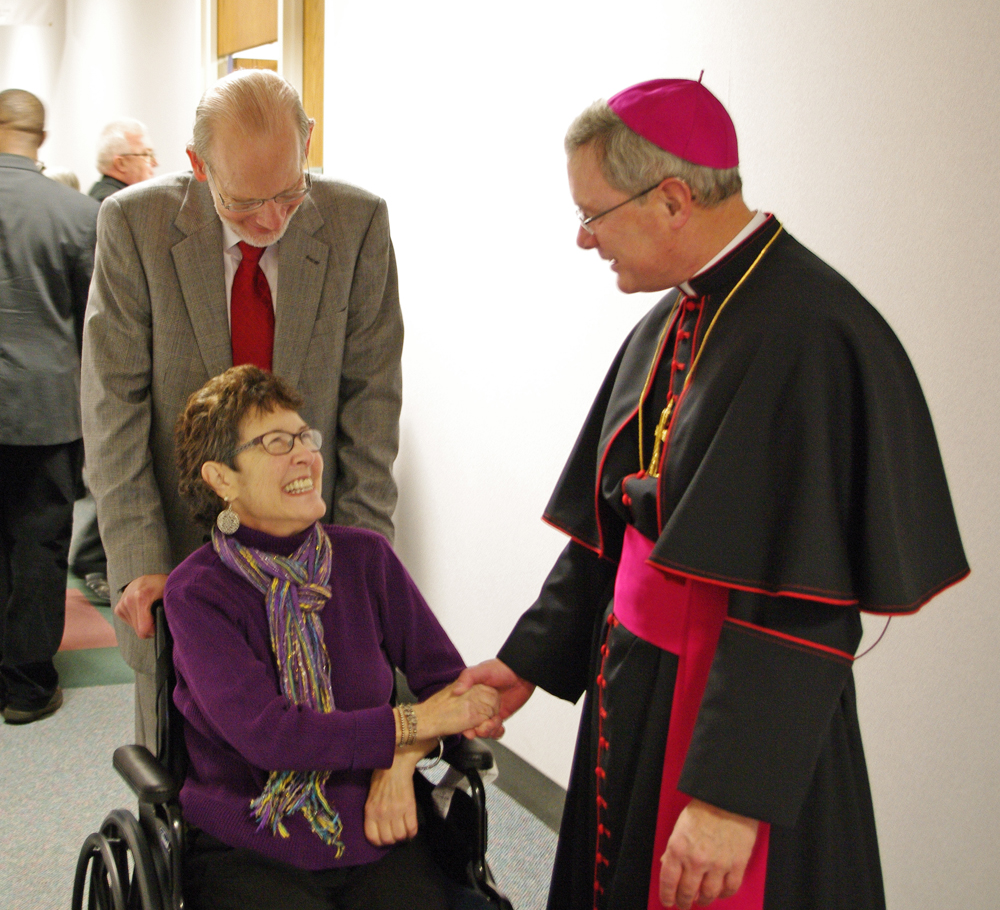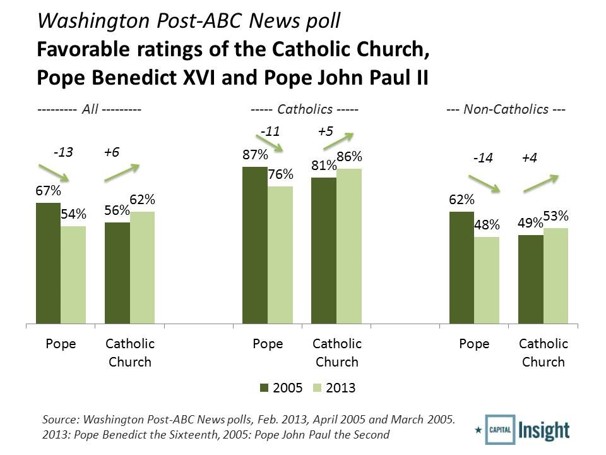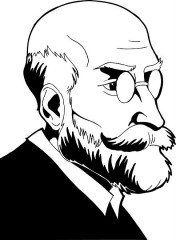My last blog on Durkheim delved into the epistemological problems resulting from individualism. Anne Rawls (whom I have been quoting in these blogs), interpreting Durkheim, said that an individualistic perspective on religion highlights the importance of beliefs over practices. Indeed, Rawls argued the Durkheim believed that “ideas” are merely retrospective accounts of what took place in communal ritual practices. More specifically, the categories of understanding (ideas) are the result of ritual practices not the other way around. Rawls is not suggesting that ideas do not ever affect our practices, indeed, practices and ideas are often mutually reinforcing, but epistemologically considered practices came first then the categories of understanding. Continue reading
What do data tell us about feetwashing at Catholic Parishes?
 So, what do sociological data tell us about how the mandatum is practiced in the US? What percentage of parishes (or dioceses) allow women’s feet to be washed as part of their Holy Thursday service? What types of parishes are more (or less) likely to do so? Does engaging in this (yearly) practice of footwashing have a measurable impact on a parishioner’s capacity to empathize with and/or serve others?
So, what do sociological data tell us about how the mandatum is practiced in the US? What percentage of parishes (or dioceses) allow women’s feet to be washed as part of their Holy Thursday service? What types of parishes are more (or less) likely to do so? Does engaging in this (yearly) practice of footwashing have a measurable impact on a parishioner’s capacity to empathize with and/or serve others?
The answer to all of these questions and more is: I don’t know. The ugly fact is that I know of no data exploring footwashing practices in U.S. Catholic parishes.
OK, so the title of my post is a bit misleading, because my point is actually to highlight how little we (social scientists) know about parish practices, such as the mandatum. Or even about much more common practices such as receiving the Eucharist, confession or other sacraments, and devotions. (The two practices that most commonly receive attention are mass attendance and prayer, but even these are investigated in rather thin terms.) Indeed, there is much too little systematic research exploring the contours of Catholic parish life within Sociology. This is a lacuna within Sociology that needs to be filled. Continue reading
On a personal note: a miracle
This posting is more of a personal note than my normal research reports. Sometimes we read of modern miracles happening to other people, and marvel at God’s goodness. And then at other times we experience these same miracles ourselves, discovering that any words we use – like marvel, wonder and astonishment – all seem to be so inadequate. Still words are our only vehicle to share our experiences, and so we use them, however feebly.
My wife Kate entered the hospital in early November 2012 to have her right lower leg amputated due to the effects of long-term diabetes. The notion of an amputation was not extremely troubling to us and we both were somewhat prepared for it. In fact some doctors advised her 18 years ago to have it amputated then because of a diabetic syndrome called Charcot foot. She consulted with experts on diabetic podiatry at a university hospital and, as a result of their intervention, Kate was able to gain almost two more decades with the foot. So we were expecting this one day and were mentally prepared for it.
But along the way, both before and after the surgery, Kate had complication upon complication develop. Continue reading
Giving the Pope a Chance: Correction of the Week
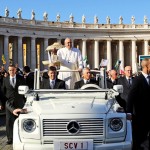 On the day of Pope Francis’ election, a good friend of mine (who is not Catholic) posted a link to a 2 year old Guardian news story discussing (then) Cardinal Bergoglio’s purported complicity in human rights violations:
On the day of Pope Francis’ election, a good friend of mine (who is not Catholic) posted a link to a 2 year old Guardian news story discussing (then) Cardinal Bergoglio’s purported complicity in human rights violations:
“The extent of the church’s complicity in the dark deeds was excellently set out by Horacio Verbitsky, one of Argentina’s most notable journalists, in his book El Silencio (Silence). He recounts how the Argentine navy with the connivance of Cardinal Jorge Bergoglio, now the Jesuit archbishop of Buenos Aires, hid from a visiting delegation of the Inter-American Human Rights Commission the dictatorship’s political prisoners. Bergoglio was hiding them in nothing less than his holiday home in an island called El Silencio in the River Plate.”
It later turned out that the story was incorrect and the newspaper’s website now lists the following correction:
This article was amended on 14 March 2013. The original article, published in 2011, wrongly suggested that Argentinian journalist Horacio Verbitsky claimed that Cardinal Jorge Bergoglio connived with the Argentinian navy to hide political prisoners on an island called El Silencio during an inspection by human rights monitors. Although Verbitsky makes other allegations about Bergoglio’s complicity in human rights abuses, he does not make this claim. The original article also wrongly described El Silencio as Bergoglio’s “holiday home”. This has been corrected.
Continue reading
Prayer, the Pope Emeritus and the New Evangelization
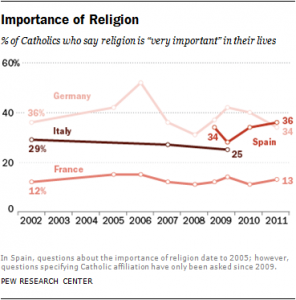 One of the central legacies of Pope Emeritus Benedict XVI’s papacy has been his proactive response to global secularization, especially to decades of decline in religious observance among Europeans. Taking up John Paul II’s call for the New Evangelization, Pope Benedict XVI called for a fresh sharing of the Gospel in “those regions awaiting the first evangelization and to those regions where the roots of Christianity are deep but who have experienced a serious crisis of faith due to secularization.” But unlike some philosophies of evangelization, a central tenet of his teaching has been that the centrality of prayer in this mission. Benedict XVI understands prayer as holding a two-fold significance in evangelization. First, those sharing the faith must first be re-evangelized themselves, growing in habits of prayer and contemplation amidst life’s busyness; and likewise, among those with whom they share the faith, prayer constitutes a deeply personal and essential means by which one encounters God. Benedict XVI writes, “Praying actualizes and deepens our communion with God. Our prayer can and should arise above all from our heart, from our needs, our hopes, our joys, our sufferings, from our shame over sin, from our gratitude from the good. It can and should be a wholly personal prayer.
One of the central legacies of Pope Emeritus Benedict XVI’s papacy has been his proactive response to global secularization, especially to decades of decline in religious observance among Europeans. Taking up John Paul II’s call for the New Evangelization, Pope Benedict XVI called for a fresh sharing of the Gospel in “those regions awaiting the first evangelization and to those regions where the roots of Christianity are deep but who have experienced a serious crisis of faith due to secularization.” But unlike some philosophies of evangelization, a central tenet of his teaching has been that the centrality of prayer in this mission. Benedict XVI understands prayer as holding a two-fold significance in evangelization. First, those sharing the faith must first be re-evangelized themselves, growing in habits of prayer and contemplation amidst life’s busyness; and likewise, among those with whom they share the faith, prayer constitutes a deeply personal and essential means by which one encounters God. Benedict XVI writes, “Praying actualizes and deepens our communion with God. Our prayer can and should arise above all from our heart, from our needs, our hopes, our joys, our sufferings, from our shame over sin, from our gratitude from the good. It can and should be a wholly personal prayer.
The Pew Forum recently highlighted research on the status of today’s European Catholics, including their opinion of the Catholic Church and of religion in general, their Mass attendance, etc. An interesting area of their research included the role of prayer in the life of European Catholics. Notably, the research showed that few European Catholics said they engaged in prayer at least once a day. Results differed significantly among Western European
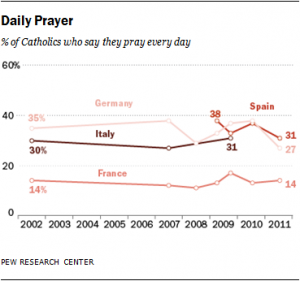 countries. German and Spanish Catholics pray more than French Catholics, for example, who are least likely among the countries polled to engage in daily prayer (between 11% and 17% reported daily prayer). Yet among German and Spanish Catholics, only four-in-ten said they engage in daily prayer. Slightly less, about three-in-ten, Italian Catholics said they pray daily in recent polls.
countries. German and Spanish Catholics pray more than French Catholics, for example, who are least likely among the countries polled to engage in daily prayer (between 11% and 17% reported daily prayer). Yet among German and Spanish Catholics, only four-in-ten said they engage in daily prayer. Slightly less, about three-in-ten, Italian Catholics said they pray daily in recent polls.
The role of prayer in the New Evangelization (NE) is clearly central for the Pope Emeritus. Perhaps future, more in-depth research on the prayer lives of European Catholics would be a useful means of measuring the effectiveness of its there. But with daily prayer so little a part of the lives of today’s European Catholics, the NE has a long road ahead…
Welcome to the World, Samuel!
Big News from Gary Adler:
“I’m happy to report some exciting news: Samuel was born Friday at 12:10 PM. He weighed 8 lbs 12 ozs, stretched to 21 3/4 inches, and announced a preferred papal candidate on the first day of the ‘interregnum.’ Our lips, however, are sealed. Baby and mommy are doing great after getting home late Monday afternoon.”
Durkheim- part three
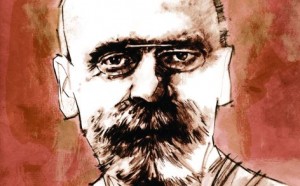 At the end of my last blog I wrote that Durkheim believed that most epistemological problems resulted from individualism, a point I would like to develop further in relation to religion by referring, once again, to Anne Warfield Rawls’ book Epistemology and Practice: Durkheim’s The Elementary Forms of Religious Life (Cambridge, 2004). Moreover, in doing so, it will be shown that Durkheim had great respect for archaic religions – a position many of his contemporaries did not hold. Continue reading
At the end of my last blog I wrote that Durkheim believed that most epistemological problems resulted from individualism, a point I would like to develop further in relation to religion by referring, once again, to Anne Warfield Rawls’ book Epistemology and Practice: Durkheim’s The Elementary Forms of Religious Life (Cambridge, 2004). Moreover, in doing so, it will be shown that Durkheim had great respect for archaic religions – a position many of his contemporaries did not hold. Continue reading
Catholic Public Opinion Research in the Wake of Pope Benedict XVI’s Resignation
With Pope Benedict XVI’s resignation, the news media has found it a good time to discuss public opinion research on Catholic related issues. For instance, The Washington Post has an article today entitled “Benedict XVI leaves as popular pope, but no John Paul II,” which discusses favorability ratings of the Catholic Church, Pope Benedict XVI, and Pope John Paul II. Looking at the graphic, I found it interesting that while both Catholics and non-Catholics in the U.S. have a less favorable impression of Pope Benedict XVI than they had of Pope John Paul II at the end of his papacy, both Catholics and non-Catholics now rate the Catholic Church more favorably than they did in 2005. It is interesting to speculate on why there might be an increase in favorable impressions by Catholics (and non-Catholics) toward the Catholic Church. Perhaps the higher rating is due to stricter standards regarding clerical sex abuse on behalf of Church leaders, as well as the fact that more time has passed since the clerical sex abuse crisis came to forefront of media attention in 2002. Such findings also show that the Catholic Church is still rated favorably by those who self-identify as Catholic, despite most American Catholics not attending Mass weekly.
Turning to Pope Benedict XVI’s favorability, it is worthwhile to note that the graphic accords with previous research by the Pew Forum on Religion & Public Life, which in August of 2012 found that 74% of Catholics were satisfied with the leadership of the pope. Thus, overall Catholics view Pope Benedict favorably.
Feel free to post any other interesting articles related to public opinion research on Catholics that you have come across since Pope Benedict XVI’s resignation in the comment section below.
Durkheim (cont’d)
My last blog on Durkheim may have left some a little unclear as to the distinction Durkheim makes between his epistemology and his sociology of knowledge. My hope is that the following might help clear up this distinction and, if it does not, that readers will be drawn to read Anne Warfield Rawls’ article on this topic (“Durkheim’s Epistemology: The Neglected Argument” 1996, AJS, 102[2]). Nevertheless, Rawls believes that this distinction is a major point of confusion about Durkheim’s work. As the abstract to her article states: Continue reading
A Pope Resigns!
Scholars will, undoubtedly, be discussing this historic day in Catholicism for years to come. While there is not a great deal of scholarship on the papacy by sociologists of religion, we’d be remiss as bloggers to not mention this historic moment.
One of the most clear and insightful accounts I have seen thus far is “Can a Pope Resign?” by Fr. Thomas J. Reese, SJ in The National Catholic Reporter.
I did quickly do some research to see if there had been any social scientific analysis of this papacy, and found just one recent piece “Benedict the Bifurcated: Secular and Sacred Framing of the Pope and Turkey” authored by Valenzano and Menegatos and published by the Journal of Media and Religion in 2008.
Feel free to react to the resignation or to note other insightful accounts in the comments.
